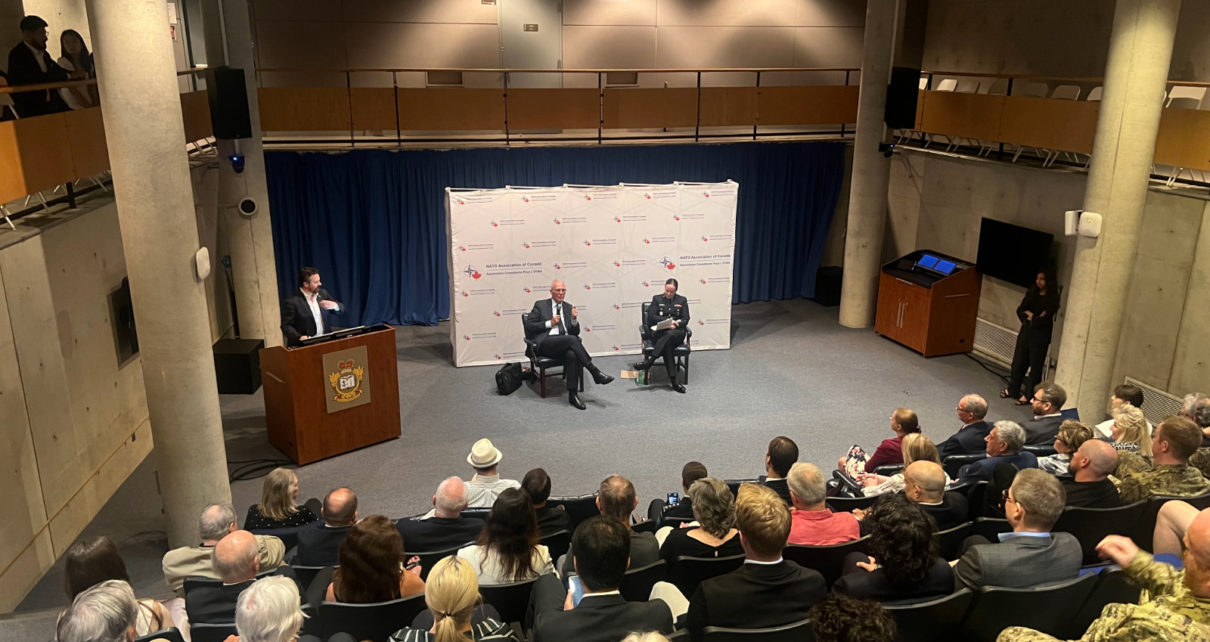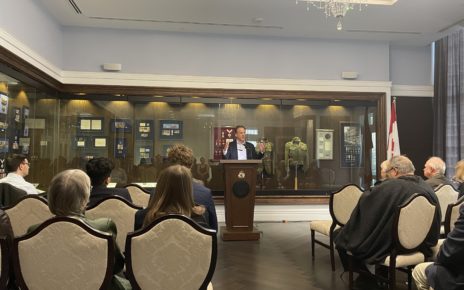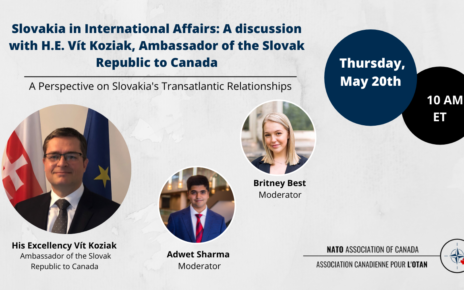On July 11, 2025, the NATO Association of Canada (NAOC), in partnership with the Ukrainian War Veterans Association of Canada and the Canadian Forces College Foundation, organized a discussion focused on Canada’s enduring military support for Ukraine. The evening featured two guest speakers: the Honourable Bill Blair, former Canadian Minister of National Defence, and Lieutenant-Colonel Melanie Lake, former Joint Task Force Commander of Operation UNIFIER. The event was attended by over 75 participants and included a discussion moderated by Robert Baines, a Q&A session, and a networking reception.
The event commenced with opening remarks from NAOC board member Kathryn E. Langley Hope, who emphasized that Ukraine’s survival is essential for maintaining international peace and security. Following Kathryn’s remarks, NAOC CEO Robert Baines offered his introductory comments. He spoke about the importance of the rules-based international order, emphasizing the inviolability of state borders – a rule that is currently being violated in Ukraine and will be disregarded by other NATO adversaries if Russia is not defeated and brought to justice.
The first guest speaker, the Honourable Bill Blair, began by highlighting the professionalism of the Canadian Armed Forces (CAF). He mentioned that Canada-led training provided to Ukraine before the Russian full-scale invasion contributed to Ukraine’s successful resistance in the initial stages of the war. Mr. Blair also noted that the CAF’s expertise has been previously well-regarded by other NATO member states. Nonetheless, he admitted that Canada’s military has suffered decades of financial neglect. NATO members have long expressed a concern about the Government of Canada’s insufficient financial contribution to the alliance. The former Minister of National Defence called for an increased level of investment in CAF, with particular emphasis on improved recruitment and retention of personnel as well as modernization of military training. Mr. Blair also spoke about allocating funds to the technological defence sector. He touched on Canada’s recent investments in Ukraine’s drone development and production. Given their advanced technology and combat-proven performance, Ukrainian drones offer Canada a strategically valuable investment opportunity. They strengthen Ukraine’s military capabilities while simultaneously enhancing Canada’s technological defence sector through knowledge transfer and potential integration into domestic manufacturing.
The second speaker, Lieutenant-Colonel Melanie Lake, reflected on her time as the Commander of Operation UNIFIER, CAF’s military training mission in Ukraine aimed at strengthening the capacity of the Ukrainian Armed Forces. In 2021, amidst an intensifying Russian build-up that preceded the invasion, Canada, alongside other NATO members, continued training Ukraine’s military. Uninterrupted training served as a strong sign of support for Ukraine and a demonstration of NATO’s unity. Lieutenant-Colonel Lake also acknowledged that operation UNIFIER was as much about Canada learning from Ukraine as it was about Ukraine learning from Canada. She emphasized that the training functioned as a two-way exchange of knowledge and expertise, instead of adhering to a rigid top-down model. Elaborating on what Canada can learn from Ukraine, Lieutenant-Colonel Lake mentioned Ukraine’s high level of civilian-military integration. She spoke about all of society’s mobilization against Russian aggression and an understanding of the army’s indispensable role in society’s survival. Canada’s lack of direct military threats in recent decades has weakened this integration and contributed to the underfunding of the armed forces. Lieutenant-Colonel Lake’s discussion about the lessons Canada can draw from Ukraine, together with Mr. Blair’s remarks regarding Ukraine’s promising technological defence sector, demonstrate that Ukraine is not just a bleeding wound on NATO’s budget. It is a reliable partner with extensive knowledge of modern land warfare, which the alliance can leverage to maintain strategic superiority against its adversaries.
Both guest speakers discussed the tremendous human cost of the Russian war against Ukraine. Lieutenant-Colonel Lake mentioned the recent increase in attacks targeting civilians and their growing intensity across the country. She emphasized that Ukraine is fighting against a much larger and conventionally more powerful enemy, with millions of civilians paying an enormous price for resistance. On the same topic, Mr. Blair noted that NATO must support Ukraine not for “as long as it takes” but until complete victory. It is the alliance’s responsibility to give Ukraine enough resources not only to continue withstanding the aggression but to reverse the course of the war in Ukraine’s favor.
Elaborating on the possibility of Ukraine’s victory, Lieutenant-Colonel Lake highlighted the need to preserve NATO’s cognitive sovereignty. That is, to refrain from falling for Russian disinformation campaigns that portray Ukraine as militarily weak. Russia has long been attempting to achieve NATO’s disunity and inaction by persuading the alliance’s members that Ukraine will never be able to win the war. It is vital that NATO does not succumb to these narratives. The alliance must recognise Ukraine’s strength and provide sufficient support for the country’s victory.
Throughout the conversation and during the Q&A, both speakers agreed that it is essential to communicate to Canadians that increased defence spending is indispensable to ensuring Canada’s security. The primary goal of a greater defence budget is to make the country safe for its residents. As Canada seeks to grow and modernize its army, it stands to gain valuable insights from Ukraine, particularly given Ukraine’s rapid and effective military transformation over the past three and a half years.




